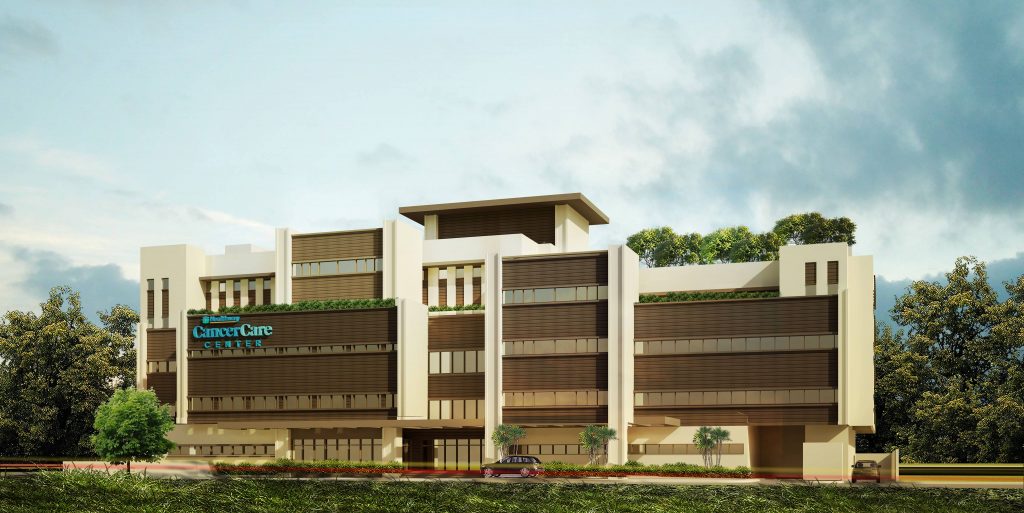
Facade of the Healthway CancerCare Center, the Philippines’ first dedicated specialty cancer hospital
MANILA – As the country continues to grapple with COVID-19, AC Health takes a valuable lesson from its 187-year-old parent Ayala Corporation: Don’t put all your eggs in one basket.
Armed with a P10 billion investment, AC Health has gone a long way in addressing the fundamental gaps in accessibility, affordability, and quality of healthcare. With its President & CEO, Paolo Borromeo, at its helm, AC Health has built an ecosystem that caters to the various healthcare needs of Filipinos.
“As part of Ayala’s commitment to investing in social infrastructure and human capital, AC Health’s vision is to build, invest, and connect various businesses into an integrated and seamless ecosystem of services across three key pillars of healthcare: drugstores, clinics, hospitals, and digital health,” Borromeo said.
AC Health’s portfolio comprises Generika, a chain of 700 drugstores that offer quality and affordable generic medicines; Healthway Philippines, the country’s largest clinic network; QualiMed Health Network, which operates mall-based multi-specialty clinics, stand-alone ambulatory or day surgery centers, and full-service hospitals; and HealthNow, an all-in-one healthcare app that offers telemedicine consultations, online medicine ordering and delivery, and clinic and diagnostic testing booking. AC Health also has a health technology arm, Vigos, as well as medicine importation and distribution arms, IE Medica and MedEthix.
Addressing the pandemic: 2,000 confirmed cases admitted; 300K vax doses administered
When the pandemic struck the Philippines, AC Health embodied Ayala’s commitment to nation-building by leading the group’s COVID-19 response initiatives. It has rallied its business units to work closely with the DOH, IATF, and local governments in implementing protocols across the Ayala Group and spearheading key milestones, from setting up mega-isolation facilities, testing labs to securing vaccines for employees and other stakeholders.
To help expand the country’s COVID wards, AC Health converted QualiMed’s network into COVID-19 referral hospitals, which have admitted nearly 2,000 confirmed cases as of August 10, 2021. AC Health also helped secure 1 million doses of COVID-19 vaccines for the Ayala Group via tripartite agreements with the government. It has administered over 300,000 doses of the COVID-19 vaccine since the first batch arrived in the Philippines late February. It has set up 24 vaccination sites across the country to inoculate members of priority groups across LGUs, the Ayala Group, and partner companies.
“AC Health will remain committed to supporting the country’s vaccination efforts and will continue to strengthen our partnerships with our LGUs and private sector partners, in order to vaccinate at the requisite scale and speed and to help achieve our nation’s goal of achieving herd immunity at year-end. We are proud to leverage the full strength of our network, with Healthway and QualiMed leading site operations and vaccine administration, and HealthNow functioning as our vaccine management platform to meet our goal of administering 1 million doses within 2021,” Borromeo said.
Looking beyond COVID: Building the country’s first dedicated cancer specialty hospital
According to Borromeo, as AC Health continues to invest in improving healthcare in the Philippines, it will not put all its eggs in one basket. Instead, it will strike a balance between battling COVID-19 and addressing other health issues unrelated to the pandemic.
Last month, AC Health officially broke ground for the construction of Healthway Cancer Care Center, the Philippines’ first dedicated specialty cancer hospital. The 100-bed facility, which is expected to be completed in July 2023, will offer a complete range of cancer services from screening, diagnosis, treatment to post-cancer care.
The Healthway Cancer Care Center will be equipped with 20 chemotherapy chairs, 4 operating theaters, and state of the art diagnostic and therapeutic equipment, optimized for cancer screening, diagnosis, and treatment. The Ayala Group has invested over P2 billion for this facility and has partnered with Varian-CTSI, a leading oncology service provider, to develop and operate it.
Beyond the cancer hospital, AC Health aims to leverage its integrated healthcare network to expand its oncology services. A hub-and-spoke model, involving its integrated clinic and hospital network, allows AC Health to drive access to affordable cancer care for patients across the country. As such, Healthway and QualiMed will serve as “spokes” of the model and extensions of the cancer hospital “hub.” This provides patients more avenues to seek consultation and have easier access to cancer screening and detection. The vision of this model is to provide impact and solutions to the many Filipinos in need of cancer services.
“The eventual growth of the healthcare industry will be largely dependent on its ability to regain patient trust and confidence to continue looking after non-COVID healthcare issues. AC Health remains in a unique position to ride on these key trends with our expanded ecosystem of end-to-end services and platforms for all patients and customers,” Borromeo said.
For more information
YLA ALCANTARA
Head, Brand and Reputation Management
Ayala Corporation
e-mail – alcantara.ypg@ayala.com
JANELLE MICAELA S. PANGANIBAN
Strategy and External Affairs Specialist
AC Health
e-mail: panganiban.jms@achealth.com.ph

